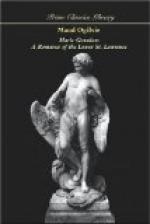“Where did you leave your boat?” questioned madame.
“At Father Point light-house with Jean Gourdon. He is to drive up with the pilot to-morrow, and by that time will have skinned the seals.”
“Surely the steamer is late this week?”
“Yes, but she will pass Father Point early to-morrow morning; she was telegraphed from Matane, where there has been a dense fog.”
“I am glad, Noel, you had such good luck this time.”
“Yes, the porpoise will keep us in oil all winter, and as for the seal-skins, I can sell them at Quebec for a good round price. So far so good. But this is the first stroke of luck this year. It has been a poor season. Have you any news, my mother?”
“No, nothing much, my son. There is to be a great pilgrimage to the shrine of the Good St. Anne next week. Hundreds of lame, blind and sick folk are coming from all parts of the country—from Quebec, and even from Gaspe. Oh, my son, it is wonderful what the Good St. Anne does for her children.”
“Yes, yes,” said Noel, impatiently, “but I want to hear the news of the people here. How is Marie Gourdon?”
“Marie Gourdon? Oh! much as usual—always singing or playing the organ at the church, and M. Bois-le-Duc encourages her. I call it nonsense myself,” and the old lady shrugged her shoulders deprecatingly.
“But, my mother, she sings like an angel.”
“Yes, yes, Noel; so Eugene Lacroix says too.”
“Eugene Lacroix!” said Noel, starting; “I thought he was in Montreal.”
“He has been here for the last week. He came down for a holiday, and is always with Marie Gourdon.”
“Yes, yes, they are old friends. I do not care much for Eugene Lacroix. He seems to me a dreamy, impractical sort of person, and only thinks of his books and those absurd pictures he is always making.”
“You think them absurd?” replied madame.
“M. Bois-le-Duc told me he had great talent. You know that, for a time the cure sent him to Laval at his own expense, and now talks of sending him to Paris.”
“To Paris! and for what purpose?”
“Oh! the cure thinks he will make a great painter. He is always painting during his holidays. I’m sure I can’t see the good of it.”
“Well, my mother, M. Bois-le-Duc is a very clever man, and whatever he does is good, but I, for one, have no very high opinion of Eugene Lacroix.”
While this conversation had been going on, Noel McAllister did ample justice to the good fare his mother set before him. Madame McAllister was nothing if not practical, and cooking was one of her strong points. Her bouillon, a sort of hotch-potch, was so good that a hungry Esau might well have bartered his birthright for it. Her pancakes and galettes were marvels of culinary skill.
Noel, having appeased his appetite, sharpened by the salt sea breezes, and after enjoying a pipe, said, “Now, my mother, I think I shall go out for a walk and hear the news. I shall not be late.”




